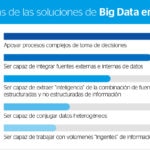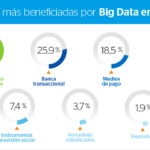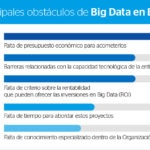Solutions to boost their growth and innovation; data management solutions; solutions to improve efficiency and productivity. These are the three main areas that banks and insurance companies are focusing on to develop products and services related to Big Data.

The digital transformation of the financial sector is a fact. Banks and insurance companies are implementing internal processes to adapt to this new age, and the solutions offered by Big Data are a perfect pretext for successfully carrying out this transformation.
And the proof is precisely in the data. According to the Big Data in the Spanish Financial Sector report prepared by EY, FrontQuery and Teradata, nearly 30% of the companies in the financial sector (banking and insurance companies) in Spain are already capitalizing, to a greater or lesser extent, on the opportunities offered by these solutions.
The key is to know how to make the most of this huge amount of information to improve a bank's different processes, as well as its services and products. The challenge: To become a “smarter” and, therefore, more competitive bank thanks to this knowledge.

35% of respondents believe that Big Data tools are an essential means for improving efficiency in the complex decision-making processes. Moreover, 29.4% value the ability to integrate both internal sources from the bank and external sources, with the possibilities afforded by this data cross-referencing.
Other highly rated benefits are the “intelligence” that can be extracted from the sources of structured and unstructured data sources, a well as the ability to combine all kinds of data, despite the large volume of information.
Investments and means of payments are the areas that benefit the most
Within a financial institution, those responsible for investment advice (33.3%), transactional banking (25.9%) and services and products related to means of payments (18.5%) benefit most from the application of Big Data tools to their processes.

However, there are still some barriers to the implementation of Big Data initiatives, particularly as regards the budget (28.1%).
The limited technological capabilities that, at least for the time being, are available in some financial institutions is another major barrier. Although to mitigate these barriers, these digital transformation processes are being carried out in many of them.
Those responsible for implementing Big Data tools in these institutions also have to listen on many occasions to the question about the return on investment for this type of tools, as will as the time needed to the reap the benefits they offer.

“The financial sector is immerse in an unstoppable transformation process, where data analysis is already a strategic pillar for achieving smart institutionscapable of facing the new challenges that the changes in the market and in their customers are bringing”, according to one of those who conducted this study, Beatriz Sanz, a partner and analytics leader for EY's EMEIA.
Information on the survey:
The survey on which the study is based was aimed at more than 100 senior executives of the Commercial, Marketing, IT/Technology and Operations areas, among others, covering over 80% of the banking and insurance sectors in Spain. The first edition was conducted in 2014 and a second was completed in January 2015, which has enabled the conclusions of the first report to be validated.